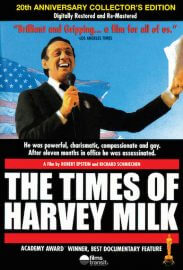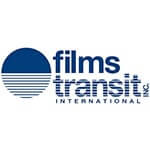
https://www.filmplatform.net/product/times-harvey-milk
Vividly recalling the tumultuous political and social climate of San Francisco in the 70s, The Times of Harvey Milk builds a brilliant, gripping portrait of what was really lost when San Francisco City Counsillor Harvey Milk and Mayor George Moscone were brutally murdered by fellow Counsillor Dan White in November 1978. Spellbinding and intensely moving from start to finish, The Times of Harvey Milk is as relevant today as when it won the Academy Award in 1984.

In 1978, as Rob Epstein was completing work on the landmark feature documentary WORD IS OUT, which told the stories of 26 gay men and lesbians from across America, events in San Francisco began to capture his attention.
Gay men and lesbians were coming out in droves all across the country in the late 1970’s. In response, a legislative political attack aimed at gays and lesbians was mounted by California State Senator John Briggs, who introduced Proposition 6 onto the State ballot. The measure was intended to ban all openly gay person from working in the public school system, for fear they might be perceived as “role models.” For the first time anywhere in America, gay issues were being played out in the political arena. Rob’s original idea was to make a film about this campaign and the issues and conflicts the situation presented.
While working on this early idea, Rob witnessed Harvey Milk emerge as the leader in the fight against Proposition 6. Harvey Milk had only recently been elected to the San Francisco Board of Supervisors, making him the first openly gay politician in California to be elected to office. Tirelessly campaigning throughout the state, Milk debated Briggs on the issue, revealing his wit, humor, anger, and charisma to a much larger public than ever before. On the first Tuesday of November 1978, Proposition 6 went down to a resounding defeat. Just weeks later, on November 27, 1978, Harvey Milk was murdered in his city hall office, as was Mayor George Moscone, by disgruntled former Supervisor and police officer Dan White.
Standing on the front steps of San Francisco’s City Hall along with other San Franciscan’s immediately after the assassination, and marching among 50,000 San Franciscans walking with candles silently down Market Street that evening, Rob knew that his film now had a deeper focus. The story didn’t end with the Proposition 6 campaign; that was only one manifestation of anti-gay beliefs that was being brought to surface as gay men and women found their rightful place. Harvey Milk’s murder was another.
On May 21, 1978 the Dan White trial concluded with White receiving a minimum seven year sentence for “involuntary manslaughter.” Riots broke out in front of City Hall, where a dozen police cars were torched.
By the Spring of 1978, Rob received his first production grant. With this initial funding Epstein conducted dozens of pre-interviews on video tape, gathered archival footage, and shot initial material for what was now titled “The Harvey Milk Film Project.” While working as an assistant editor on other documentaries, he edited a 20-minute trailer using excerpts from some of the material he had gathered.
The winter of 1980 was a turning point in the development of the project. With the help of Epstein’s friend Richard Schmiechen, a New York-based filmmaker, he produced a grass-roots benefit for the project at a gymnasium in Manhattan, hosted by legendary film historian and gay activist Vito Russo (The Celluloid Closet, Common Threads: Stories from the Quilt) . This event represented a significant juncture for the Harvey Milk Film Project in several respects: the trailer was a huge hit and several thousand dollars was raised that evening; the film now had the support and good will of the gay community beyond the borders of San Francisco; and, most significantly, Richard Schmiechen joined Rob as the producer of the film.
Rob and Richard spent the next two years doing research and fundraising. By summer of 1983 Rob had written a treatment for the film, and enough funds had been raised to shoot the principle interviews. Cinematographer Frances Reid was hired to shoot the interviews, and Deborah Hoffmann was hired to co-edit with Rob.
In the early of Spring of 1984 a rough-cut of the film was shown for the first time to an auditorium of friends and supporters. The response was overwhelming, and the filmmakers knew they had something special. Rob invited composer Mark Isham to the rough-cut screening to see if he would consider doing the music for the film. Epstein knew Isham from the film NEVER CRY WOLF, which was Isham’s first film score and on which Epstein worked as an assistant sound editor. Isham was impressed by the rough-cut, and agreed to do the music, eventually composing as well as performing the magnificent score himself.
When it came time to choose a narrator, Rob wanted a voice with character and one that had some connection to the story being told. Richard Schmiechen suggested Harvey Fierstein, who had just had a great success with his play Torch Song Trilogy, Fierstein immediately agreed. The first narration recording session was conducted in the apartment where Harvey then lived in Brooklyn.
In August 1984, the THE TIMES OF HARVEY MILK had its premiere at the Telluride Film Festival, followed by the New York Film Festival in September. >From there it went on to festivals all over the world. In January 1985 the film was awarded the New York Film Festival Critics Circle Award for Best Documentary. Several weeks later, Rob was with the film at the Berlin Film Festival when he learned that it had been nominated for an Academy Award.
THE TIMES OF HARVEY MILK faced tough competition at the Oscars that year — it was thought to be a toss up between the HARVEY MILK and STREETWISE, a film about street kids in Seattle. Should HARVEY MILK win, Schmiechen and Epstein knew they had to take advantage of the fact that this would be the first gay-themed picture to be awarded an Oscar, and that they must use their 30 seconds to acknowledge the subject and content of the film, and the fact they themselves were gay filmmakers. The film did win; Schmiechen thanked the gay community and Harvey Milk, and Epstein thanked his then “partner-in-life,” John Wright for his love and support during the six years it took to make the film.
THE TIMES OF HARVEY MILK was released theatrically, and aired on PBS in November 1985. After the television premiere, Epstein and Schmiechen won national Emmy Awards for Outstanding informational Special and Outstanding Interviewing; and Deborah Hoffmann and Epstein won Emmys for Outstanding Editing. The film also went on to win numerous other prestigious awards, including the George Foster Peabody Award for Excellence in Broadcasting.
In 1986, after being released from prison with time off for good behavior, Dan White committed suicide in his home. THE TIMES OF HARVEY MILK has gone on to become a perennial favorite on television, home video, and in classrooms. It was voted as on of the two best documentaries of the decade (1980’s) in an American Film Critics poll, and has been selected by the UCLA Film and Television Archives as an official film preservation project. The film was re-released theatrically for the first time in 35mm in the summer of 2000.